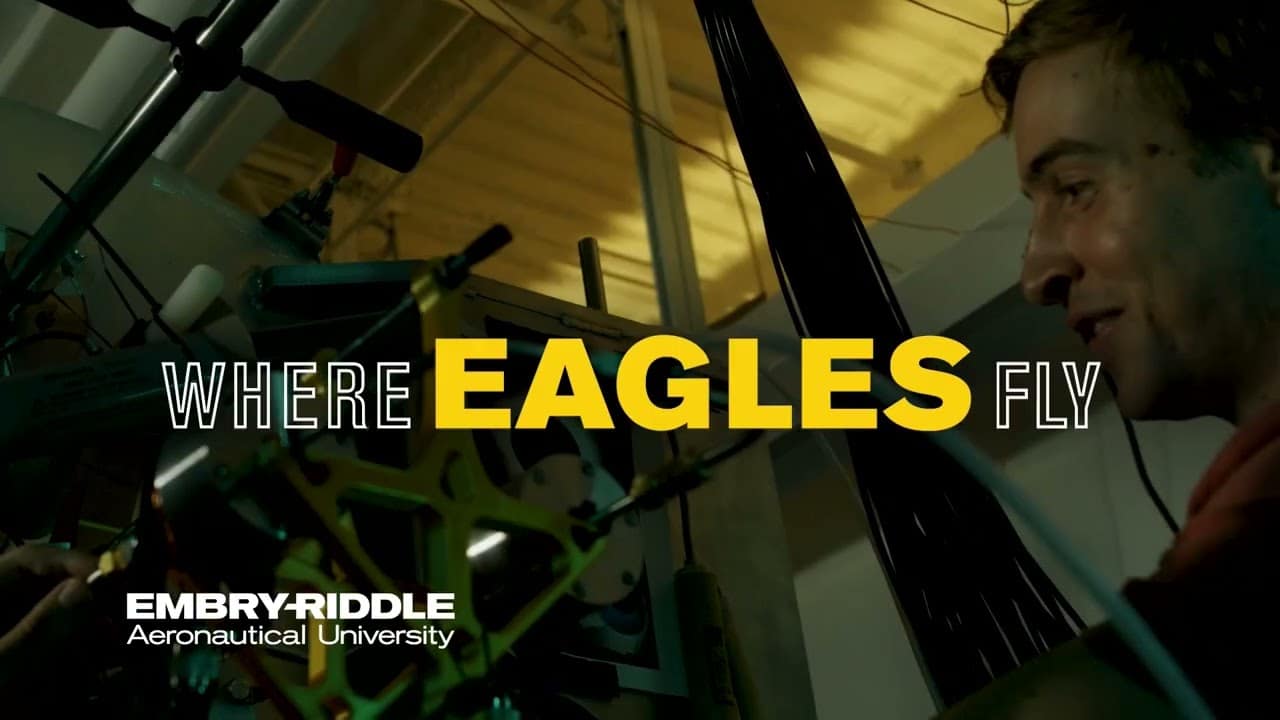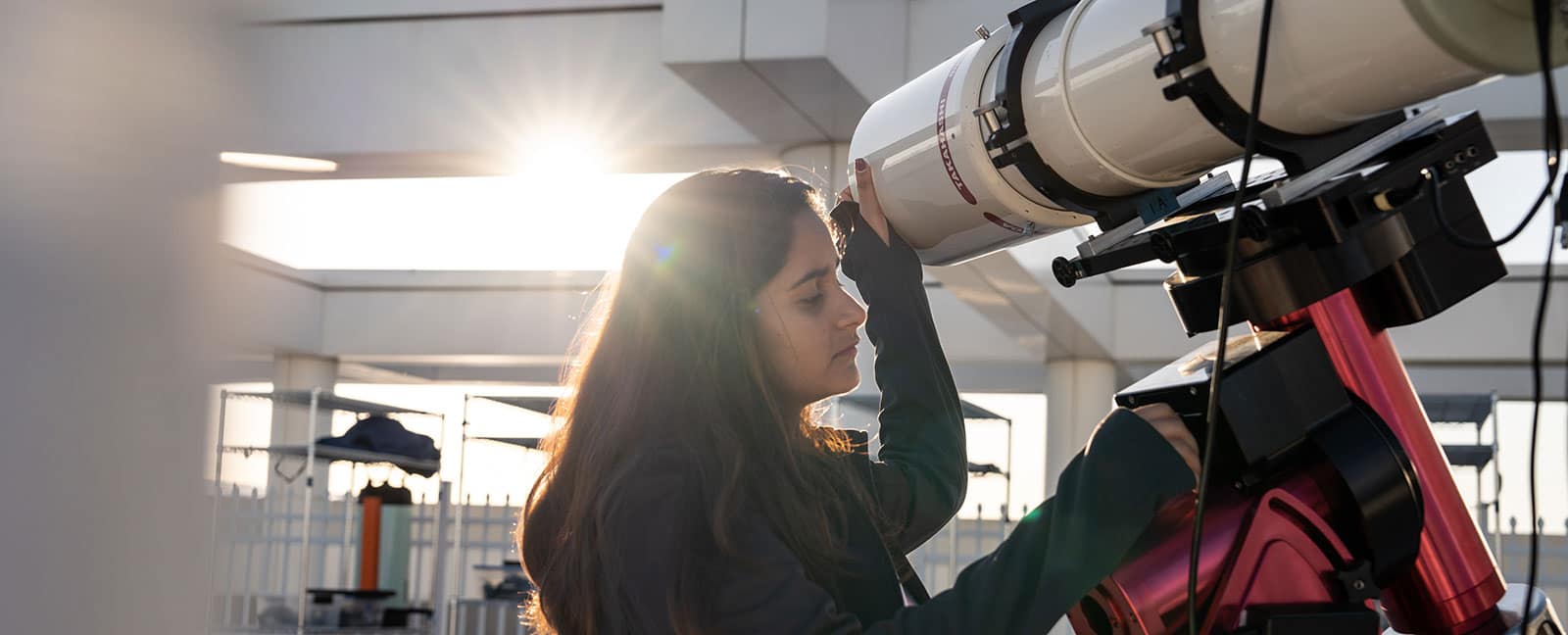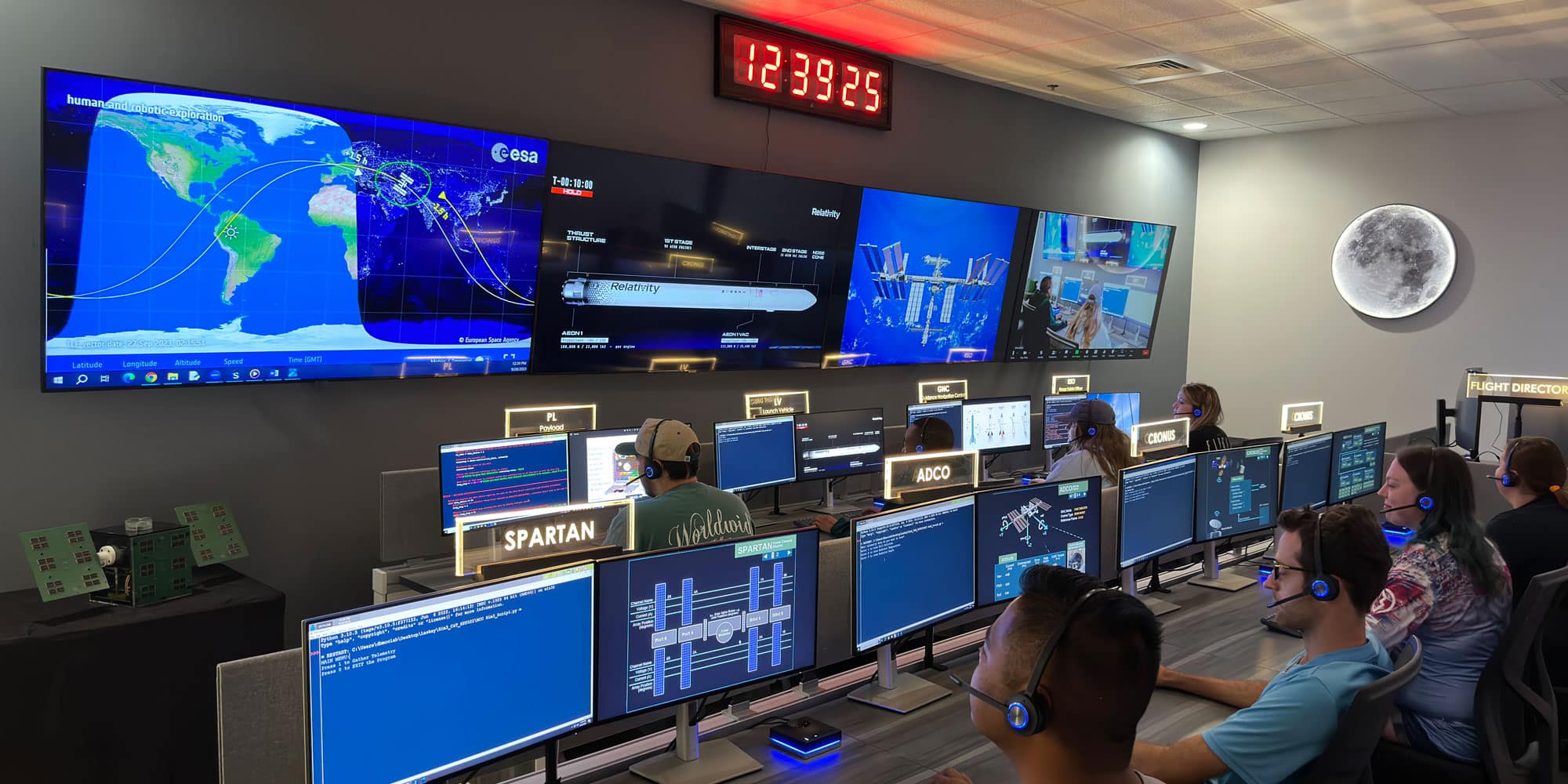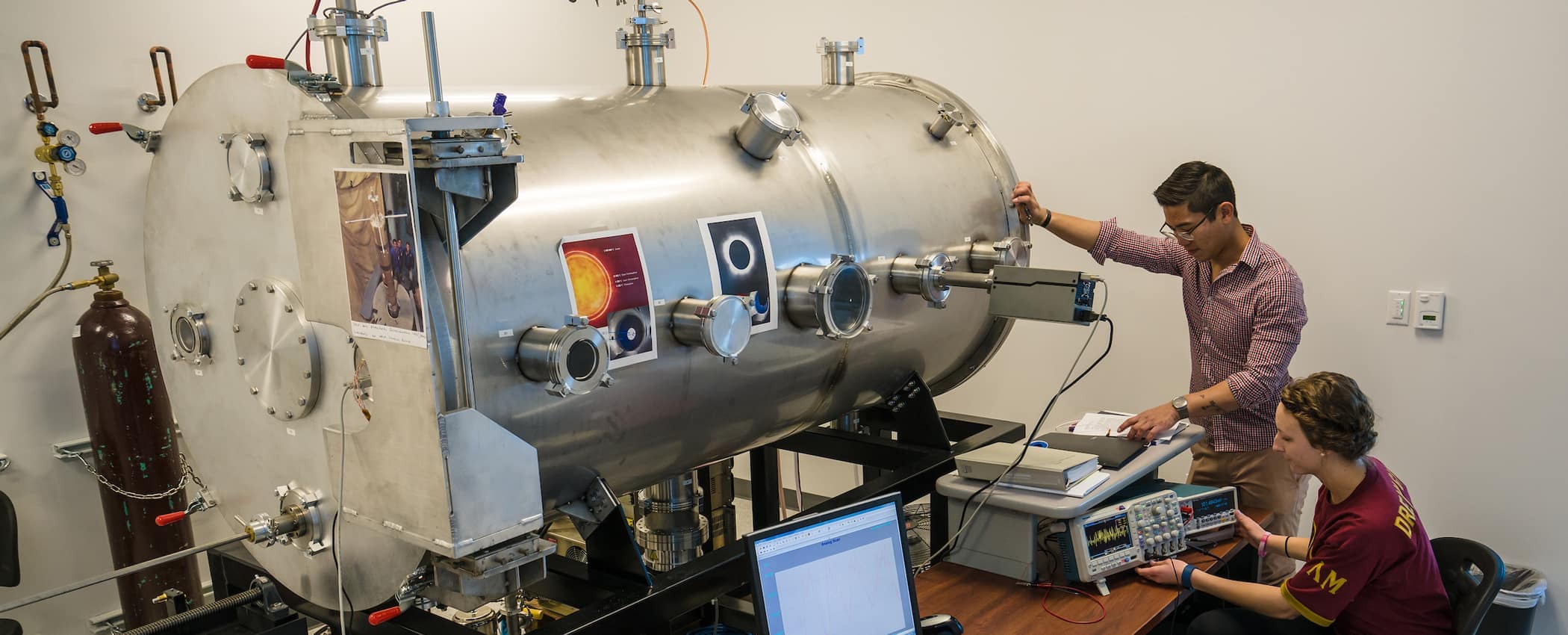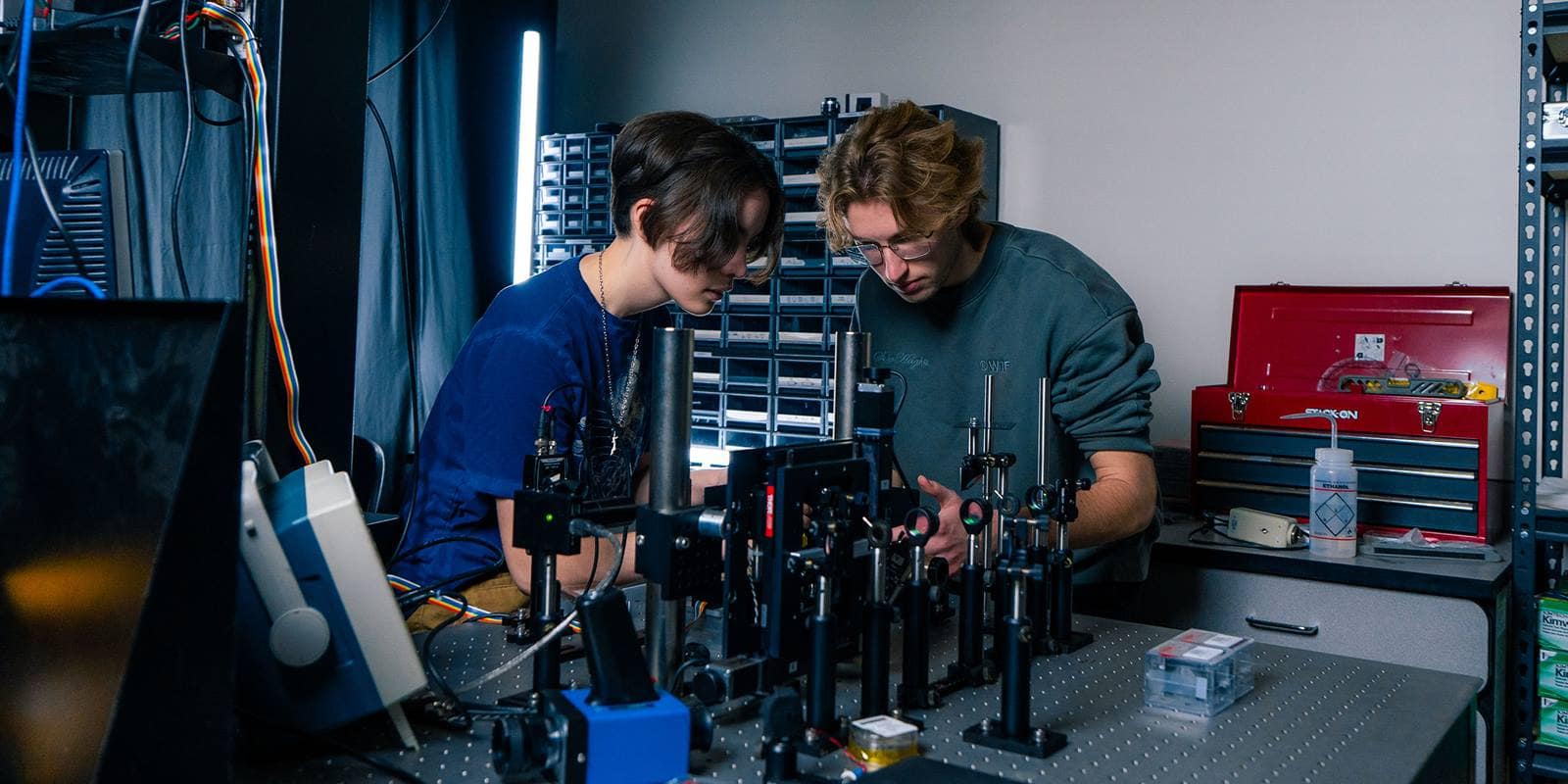
Bachelor of Science in
Space Physics
The B.S. in Space Physics allows students to explore the fundamental forces in nature by investigating atomic, nuclear and elementary particle systems.
About the Bachelor of Science in Space Physics
As the commercial space sector continues to grow, Embry‑Riddle’s Bachelor of Science in Space Physics is the only undergraduate space physics program in the U.S. dedicated to shaping well-educated students to support scientific missions. It is designed for students who demonstrate strong math and science skills with an interest in space and physics research. Space Physics majors work under the direction of faculty who are research-active physicists who share the passion for understanding the universe and enhancing technological developments.
The Space Physics program engages students in the scientific side of space exploration through studies of the Earth-sun environment, atmospheric sciences, aurorae, planetary sciences, laboratory plasma physics and exoplanets. Graduates emerge from the program ready to work in applied research careers as vital contributors in the growing field of space exploration.
Student Learning Outcomes
While earning a Space Physics degree, you will have the opportunity to:
- Design and conduct experiments, as well as analyze and interpret data.
- Explore prevailing models in the primary areas of physics.
- Gain the technical expertise required for developing new physical models.
- Understand the current state of knowledge of the physical universe.
Space Physics Career Opportunities
Careers and Employers
Embry-Riddle graduates are prepared to enter the industry as researchers and systems engineers or continue to further education to become space physicists, with a 100% placement rate within a year of graduation.
Students earning a degree in Space Physics often accept employment offers from top companies such as Lockheed Martin, MIT – Lincoln Library, the Air Force Institute of Technology and the Harvard-Smithsonian Center for Astrophysics.
Space Physics Salary Information
Receiving a degree in Space Physics from Embry-Riddle provides the opportunity for competitive salaries, averaging $70,700 annually as of 2022.
DETAILS
About Space Physics at the Daytona Beach, FL Campus
Part of the Department of Physical Sciences in the College of Arts and Sciences, the B.S. in Space Physics emphasizes the physics of the solar-terrestrial and distant-space environments. Students learn how to study the magnetic and astrophysical phenomena that occur in outer space, in the upper atmosphere of planets and on the sun.
Embry-Riddle houses Florida’s largest university-based research telescope, an instrumented 1-meter Ritchey-Chrétien reflecting telescope. Adjacent to the telescope is a helioscope to observe solar activity, providing students with hands-on experience utilizing ground-based instruments to study space phenomena.
Space Physics Information
- Credits: 120
- Online or In-Person: In-Person
- Thesis: Senior Project (3 credits)
Helpful Links
- Tour our Daytona Beach Campus
- Discover the Department’s Faculty
- Explore the Fields of Study: Applied Science & Space
- Find Related Clubs & Organizations
General Education Requirements
For a full description of Embry-Riddle General Education guidelines, please see the General Education section of this catalog. These minimum requirements are applicable to all degree programs.
| Communication Theory & Skills | 9 | |
| Humanities - Lower level * | 3 | |
| Social Sciences - Lower level * | 3 | |
| Humanities or Social Sciences - Lower or Upper level * | 3 | |
| Humanities or Social Sciences - Upper level * | 3 | |
| Computer Science (EGR 115) | 3 | |
| Mathematics (MA 241, MA 242) | 8 | |
| Physical and Life Sciences (PS 226, PS 226L & PS 227) | 7 | |
| Total Credits | 39 | |
| Program Core | ||
| EP 101 | Current Topics in Space Science | 1 |
| Mathematics | ||
| MA 243 | Calculus and Analytical Geometry III | 4 |
| MA 345 | Differential Equations and Matrix Methods | 4 |
| MA 441 | Mathematical Methods for Engineering and Physics I | 3 |
| MA 442 | Mathematical Methods for Engineering and Physics II | 3 |
| Physical Science | ||
| CHM 110 | General Chemistry I | 3 |
| CHM 110L | General Chemistry I Laboratory | 1 |
| EP 320 | Electro-Optical Engineering | 3 |
| PS 228 | Physics III | 3 |
| PS 228L | Physics III Laboratory | 1 |
| PS 303 | Modern Physics | 3 |
| PS 305 | Modern Physics Laboratory | 1 |
| PS 320 | Classical Mechanics | 3 |
| PS 400 | Senior Physics Laboratory I | 3 |
| PS 405 | Atomic Nuclear Physics | 3 |
| EP 492 | Senior Project (Or Technical Elective**) | 3 |
| Space Physics | ||
| EP 393 | Spaceflight Dynamics | 3 |
| EP 400 | Thermodynamics and Statistical Mechanics | 3 |
| EP 410 | Space Physics | 3 |
| EP 411 | Space Physics II | 3 |
| EP 420 | Planetary Science | 3 |
| EP 440 | Engineering Electricity and Magnetism | 3 |
| EP 455 | Quantum Mechanics | 3 |
| PS 214 | Introduction to Space Weather | 3 |
| Technical Electives *** | 6 | |
| Open Electives | 9 | |
| Total Credits | 81 | |
| Total Degree Credits | 120 | |
- *
Embry-Riddle courses in the General Education categories of Communication Theory and Skills, Humanities and Social Sciences and the Technical Electives may be chosen from the approved list of courses, assuming prerequisite requirements are met. Courses from other institutions are acceptable if they fall into these broad categories and are at the level specified in the Space Physics vertical outline.
- **
Please see Program Coordinator for approval of Technical Elective.
- ***
Choose from AA/AE/CEC/CIV/CS/EE/EGR/EP/ES/MA/ME/PS/SE 300-400 level.
| Year One | ||
|---|---|---|
| Credits | ||
| EP 101 | Current Topics in Space Science | 1 |
| MA 241 | Calculus and Analytical Geometry I | 4 |
| MA 242 | Calculus and Analytical Geometry II | 4 |
| CHM 110 | General Chemistry I | 3 |
| CHM 110L | General Chemistry I Laboratory | 1 |
| Communication Theory and Skills * | 6 | |
| PS 226 | Physics I | 3 |
| PS 226L | Physics I Laboratory | 1 |
| Lower-Level Humanities * | 3 | |
| Lower-Level Social Sciences * | 3 | |
| Credits Subtotal | 29.0 | |
| Year Two | ||
| EGR 115 | Introduction to Computing for Engineers | 3 |
| MA 243 | Calculus and Analytical Geometry III | 4 |
| MA 345 | Differential Equations and Matrix Methods | 4 |
| Communication Theory and Skills * | 3 | |
| PS 214 | Introduction to Space Weather | 3 |
| PS 227 | Physics II | 3 |
| PS 228 | Physics III | 3 |
| PS 228L | Physics III Laboratory | 1 |
| Lower or Upper-Level Humanities or Social Science Elective * | 3 | |
| Open Electives | 3 | |
| Credits Subtotal | 30.0 | |
| Year Three | ||
| EP 320 | Electro-Optical Engineering | 3 |
| EP 393 | Spaceflight Dynamics | 3 |
| EP 400 | Thermodynamics and Statistical Mechanics | 3 |
| MA 441 | Mathematical Methods for Engineering and Physics I | 3 |
| MA 442 | Mathematical Methods for Engineering and Physics II | 3 |
| PS 303 | Modern Physics | 3 |
| PS 305 | Modern Physics Laboratory | 1 |
| PS 320 | Classical Mechanics | 3 |
| Open Elective | 6 | |
| Upper-Level Humanities or Social Science Elective * | 3 | |
| Credits Subtotal | 31.0 | |
| Year Four | ||
| EP 410 | Space Physics | 3 |
| EP 411 | Space Physics II | 3 |
| EP 420 | Planetary Science | 3 |
| EP 440 | Engineering Electricity and Magnetism | 3 |
| EP 455 | Quantum Mechanics | 3 |
| EP 492 | Senior Project | 3 |
| PS 400 | Senior Physics Laboratory I | 3 |
| PS 405 | Atomic Nuclear Physics | 3 |
| Technical Electives | 6 | |
| Credits Subtotal | 30.0 | |
| Credits Total: | 120 | |
Get Started Now:
Summary
120 Credits
Estimate your tuition by using the Tuition Calculator
View Financial Aid Information
Learn about our General Education
Find out about transferring credits to this degree
Learn more about our Veterans & Military benefits
View our Academic Calendar
